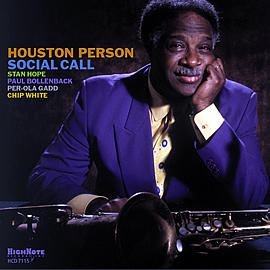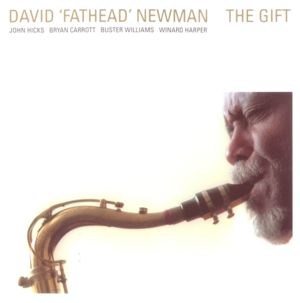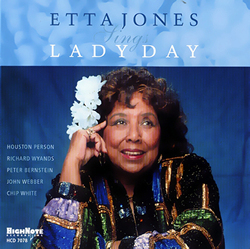Home » Jazz Articles » Record Label Profile » HighNote/Savant Records
HighNote/Savant Records
You can chew on our stuff for a good bit of time and get a real good taste out of it.
—Joe Fields
 In the mid '60s, when HighNote/Savant president Joe Fields was a young record executive at the Prestige label, he recognized talent in a young saxophone player called Houston Person. "I felt if I were to have a record company, he'd be the kind of artist I'd want," said Fields. Last month Person released his seventh album on HighNote. It's a gorgeous disc of mostly standards, featuring the deep luxurious tone of Person's tenor saxophone.
In the mid '60s, when HighNote/Savant president Joe Fields was a young record executive at the Prestige label, he recognized talent in a young saxophone player called Houston Person. "I felt if I were to have a record company, he'd be the kind of artist I'd want," said Fields. Last month Person released his seventh album on HighNote. It's a gorgeous disc of mostly standards, featuring the deep luxurious tone of Person's tenor saxophone. Eight months earlier, David "Fathead" Newman, an equally respected, and talented player, released his fourth disc for HighNote, The Gift. Eight originals swing, tribute jazz immortals, and resonate with a distinctive beauty cultivated through years of discipline.
"When we talk about fellows like Person and Newman, people look at them and say 'oh man those are two older guys, that company's been around so long, they have an old vision.' We have never lost the beat of the street," explained Fields.

Many of the artists Fields works with now are people he recorded in the '70s on his first label Muse, like trumpet player Wallace Roney and vocalist Mark Murphy. They are older, seasoned artists, who have withstood the test of time, and form strong connections with their audience.
"We do not record what I consider 'white bread artists' - having nothing to do with color of skin. A white bread artist is something that is sort of pappy, no real flavor. We do whole grain, ten grain, sink-your-teeth-into loaves. You can chew on our stuff for a good bit of time and get a real good taste out of it."
Fields started the HighNote and Savant labels seven years ago. He sold his first label Muse during the economic boom of the '80s. Originally Fields established the two labels, so he could record two styles of music. One label was meant to be for the more traditional jazz, and the other would be for music that was a bit edgier. But it didn't work out as planned. The nature of the business took over the original intention.
Thirty years ago the industry ran on a slower, scaled down stage. All a record company needed was one month to get an album out in stores, work radio, and press, and promote it. Now, with larger distribution companies, and the advent of the "street date", it takes eight weeks to market a new release. So putting out albums alternately on the two labels keeps them fresh longer.
 HighNote/Savant will release 34 albums this year. Approximately 30 signed artists make up the label's roster. Vocalist Mark Murphy has consistently been named Down Beat's 'Best Male Jazz Singer Of the Year', and the late Etta Jones' release Lady Day received a 2003 Grammy nomination. The album was released the day Jones died. "She was the most self-effacing, normal, regular human being, with no ego. She was always cooperative, always recorded in good taste, was careful to choose her songs. When she died we really had a terrible loss. There is nobody who can replace Etta. She too is one of those artists that stood the test of time. Etta was one of the best. There's only a handful of these great ladies."
HighNote/Savant will release 34 albums this year. Approximately 30 signed artists make up the label's roster. Vocalist Mark Murphy has consistently been named Down Beat's 'Best Male Jazz Singer Of the Year', and the late Etta Jones' release Lady Day received a 2003 Grammy nomination. The album was released the day Jones died. "She was the most self-effacing, normal, regular human being, with no ego. She was always cooperative, always recorded in good taste, was careful to choose her songs. When she died we really had a terrible loss. There is nobody who can replace Etta. She too is one of those artists that stood the test of time. Etta was one of the best. There's only a handful of these great ladies." This month vocalist Ernestine Anderson releases her first album for HighNote. It's a collection of standards called Love Makes The Changes. She joins a group of female vocalists on the label including Sheila Jordan, Carol Sloane, Irene Reid, and Wesla Whitfield among others.
"These are singers that really have a unique style. They're not quasi-jazz singers who could be lounge acts, who really just don't know what it is as far as the lyric is concerned. These are super singers and Ernestine fits that mold."
 Moving in on jam band territory, in September Savant released guitarist Rodney Jones' Soul Manifesto Live! and drummer Jim Payne's Sensei. In April the Melvin Sparks Band's What You Hear is What You Get came out. "Melvin grew up in that very music that you hear on his record," Fields explained. "He's not somebody who's faking playing funk, acid jazz, groove - that's Melvin. Melvin is the real thing no ifs, ands, or buts about it."
Moving in on jam band territory, in September Savant released guitarist Rodney Jones' Soul Manifesto Live! and drummer Jim Payne's Sensei. In April the Melvin Sparks Band's What You Hear is What You Get came out. "Melvin grew up in that very music that you hear on his record," Fields explained. "He's not somebody who's faking playing funk, acid jazz, groove - that's Melvin. Melvin is the real thing no ifs, ands, or buts about it." The times for the music industry have changed, but Highnote/Savant has adapted along with it. Fields remembered a simpler time when there were fewer recordings and companies. Salesmen traveled from store to store with the company's book. The albums were handpicked and put out on the shelves. Records were sent to radio stations where DJs instantly played the songs.
"Slowly the small record stores disappeared. Now the bulk of all sales are done through chains. Those account for 90% of all sales. It used to be you'd go to a store in one town. You'd go to another town there'd be a store. You'd go to the next town there'd be a store. And that disappeared."
Huge distribution companies emerged from the changing climate, and street dates were invented. This added anticipation. A company's booklet of upcoming releases came out, but the street dates were six weeks away. "You know about it but the records aren't out yet. In the next month, by the same distributor, a new book comes out and there's another HighNote record. Suddenly that new one from last month gets old. That's why we have two labels. It became a situation where we thought wait a minute, let's put one release on HighNote, and one release on Savant. It keeps the wheel going, it gives us a chance to work those releases. That's our strength here. That's what we do best."
If you turn the radio to a jazz station, chances are you'll hear a HighNote/Savant artist. Radio is one of the label's biggest marketing strategies. "You'll never make a hit single without getting radio airplay. You're not going to spend 15, 16, 18 dollars in a record store just looking at it. You have to have some exposure to it. And my own feeling is that seeing a little thumbnail image in a magazine isn't enough motivation. So my stress in getting the product to people is to stress the radio airplay."
 In addition to the major chart radio stations, the company solicits small town stations. "I feel these small stations are dealing with a constituency that does not casually buy a jazz record. They are listening to a small jazz show on a Sunday night, because they are enamored with the art. If I can put that arrow in their heart getting through to that character that's broadcasting to them on that night they've purposely tuned in - I'm connecting."
In addition to the major chart radio stations, the company solicits small town stations. "I feel these small stations are dealing with a constituency that does not casually buy a jazz record. They are listening to a small jazz show on a Sunday night, because they are enamored with the art. If I can put that arrow in their heart getting through to that character that's broadcasting to them on that night they've purposely tuned in - I'm connecting." Highnote/Savant artists may get honorable titles and glossy awards, but the true accomplishment for Fields is the longevity his artists have accomplished. An example is saxophonist Arthur Blythe who released his fourth album on Savant, Exhale, in June. Blythe became disenchanted with the American jazz scene in the '80s so he left for Europe. After Fields recorded him he started playing New York again, and resurrecting the recognition he once had.
"If you do something, you want to do it completely, to the best of your ability - see it from beginning to the end. It is satisfying," Fields said. "It's very hard to just turn a screw on an automobile line and feel like you've had any real contribution. Here if there is a mission it's the sense of self-satisfaction. And also knowing that the stuff we do here we do the best we can, and the music is good."
"The thing that won't destroy what we're doing is the people's need for the art and the music. That's the thing that buoys me. It's far from a dying art."
< Previous
Conversation with Charnett Moffett
Next >
Ray Brown: The Telarc Years
Comments
Tags
HighNote/Savant Records
Record Label Profiles
Celeste Sunderland
United States
New York
New York City
For the Love of Jazz
 All About Jazz has been a pillar of jazz since 1995, championing it as an art form and, more importantly, supporting the musicians who create it. Our enduring commitment has made "AAJ" one of the most culturally important websites of its kind, read by hundreds of thousands of fans, musicians and industry figures every month.
All About Jazz has been a pillar of jazz since 1995, championing it as an art form and, more importantly, supporting the musicians who create it. Our enduring commitment has made "AAJ" one of the most culturally important websites of its kind, read by hundreds of thousands of fans, musicians and industry figures every month.






















